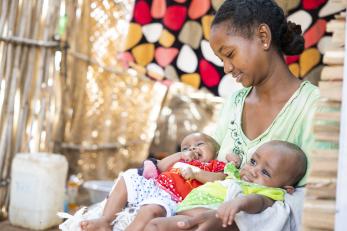Help restore U.S. global leadership on refugee protection

This month, we recognize World Refugee Day as an opportunity to shine a light on the families who have been forced to flee their homes due to conflict and persecution — waiting to return home or for a new place to rebuild their lives. Increasingly, they are waiting longer and longer: of the over 26 million refugees around the world, about 11.6 million live in protracted refugee situations and 4.1 million have been refugees for over 20 years. The COVID-19 pandemic has further increased refugees’ vulnerabilities — not only to contagion — but also to severe economic and social impacts. According to the United Nations refugee agency, UNHCR, 90% of refugee children have had their education reduced or stopped, with older girls particularly at risk of dropping out of school permanently due to COVID-19 closures.
Tell Congress to support life-saving refugee programs and increase the U.S. refugee resettlement cap.
Last month, President Biden announced that he was following through on his promise to raise the U.S. refugee admissions cap to 62,500 this year. While we're one step closer to historic refugee admission levels, there are thousands more in the world who need support abroad while fleeing conflict and persecution.
While refugees wait for durable solutions to rebuild their lives, foreign assistance is a powerful tool to help alleviate their suffering and support host communities. This critical support provides nutritious food, access to life-saving healthcare during a global pandemic, clean water and safe shelter when women, men and children are forcibly displaced from their homes, often with nothing but the clothes on their backs.
The United States has a long and proud history of supporting and welcoming refugees. Congress has an important role to play in deciding whether America will continue to be a global humanitarian leader both by holding the Biden Administration to its goal of 125,000 refugees admitted in FY22 and by funding programs to support refugees around the globe. The lives of millions depend on it.
You can help provide the funding that is a lifeline for so many families in need. Sign now and urge your member of Congress to support global refugee programming and hold the Biden Administration to its promised 125,000 refugee admissions ceiling.
Here is the letter we’ll send to Congress on your behalf:
